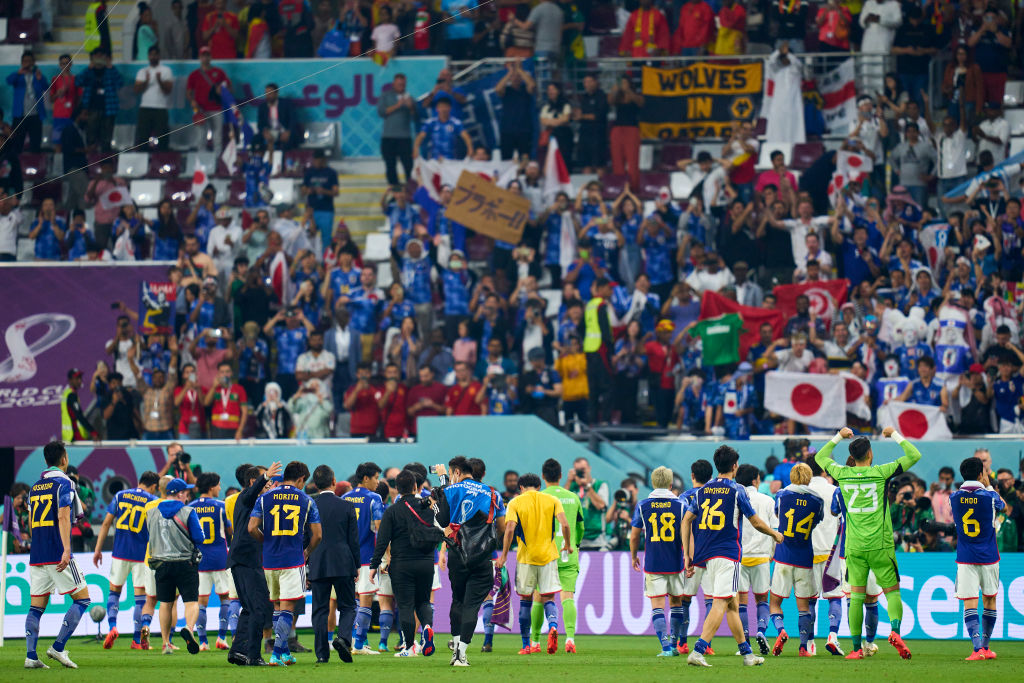For Haijme Moriyasu, Japan’s coach, football came full circle at the Khalifa Stadium on Thursday night. Fifteen minutes away from the scene of Japanese football’s biggest heartbreak, his wards beat mighty Spain to usher in a new era for Asian football.
The beauty of sport often lies in the stories of redemption that it scripts. For Japanese football, Qatar and Doha were once synonyms for agony. Now, after adding the scalp of Spain to a famous victory over Germany, they venture into the second round backed by millions of delirious fans. A generation after the Agony of Doha has come the Ecstasy of Qatar.
In 1992, Japan had won the Asian Cup on home soil, beating Iran, China and Saudi Arabia on the way to the title. In October 1993, the final round of Asian qualifying matches for the 1994 World Cup took place in Qatar. Six teams competing for two spots, with as many as 15 matches in a round-robin format played across just two weeks.
Heading into the final round of games, Japan were on course to make a first World Cup appearance, top of the table with two wins and a draw. But with only two points for a win in those days, only a point separated them from Iran in fifth place. With the exception of North Korea, each of the teams harboured hopes of making it to the USA.
When Kazuyoshi Miura – Japanese football’s first modern-day icon, who had learned his trade with Santos and Palmeiras in Brazil as a teenager – scored his 13th goal of the qualifying campaign, the pressure was squarely on the other teams. In the era before mobile telephony, it wasn’t easy to keep track of other scores in games being played at the same time, but at half team, each team knew what had to be done.
Japan and Saudi Arabia, who led Iran 2-1, were both on course for the finals. South Korea, drawing 0-0 with their northern neighbours, were heading out. In the space of nine second-half minutes, everything changed. South Korea went 2-0 up, and Saudi led 3-2 against Iran. Most crucially, Ahmed Radhi – scorer of Iraq’s only goal at the 1986 World Cup, who died from Covid-19 complications in 2020 – equalized for Iraq after taking a cross on his chest and finishing coolly past the keeper.
Japan’s race wasn’t run though. In the 69th minute, with South Korea still leading 2-0 and Saudi Arabia having stretched their advantage to 4-2, Masashi Nakayama ran on to a through ball from the Brazilian-born Ruy Ramos. His finish was unerring and Japan again had a foot in the finals.
Heading into injury time, Japan’s fate was in their hands. South Korea had won 3-0 and Saudi 4-3, but victory would keep Japan top of the heap. But just as the clock ticked past 90 minutes, Iraq won a corner. It was played short, and when the cross came in, Jaffer Salman glanced a header into the far corner of the net.
Even on the grainy footage from that long-ago day, you can see three Japanese players slump to the turf disconsolate. South Korea, who Japan had beaten days earlier with a strike from Miura, were through on goal difference. The Blue Samurai would have to wait for their moment in the World Cup sun.
It was impossible not to think of that evening as Japan soaked up the pressure from Spain’s relentless passing rhythm before twice hitting them on the break. Japan completed just 166 passes on the night, compared to Spain’s astonishing 992, but it was the unfancied Asian team that proved to be more incisive.
More than perhaps anyone else, Hajime Moriyasu, the Japanese coach, knew that it’s how you end a game that matters, not how you start it. After all, Moriyasu had been part of the Japanese midfield that evening at the Hamad bin Khalifa Stadium. “I can’t remember the changing room after the game, or speaking to the media afterward, or the bus ride back to the hotel,” he would say years later. “I had devoted myself to my World Cup dream. We had so many training camps that I spent more time with my team-mates than with my family. I could see the World Cup right in front of me but when I went to grab it, it vanished into thin air.”
Moriyasu played the last of his 35 games for Japan in 1996. By the time Japan made it to the World Cup in 1998, he had made way for an exciting new generation of stars. Even more heartbreaking was the experience of Miura. Japan’s top scorer with 14 goals in qualifying as they made it to France ’98 and the torch-bearer for a generation, he was controversially omitted from the World Cup squad.
He was 31 at the time. These days, he turns out for Suzuka Point Getters in Japanese football’s fourth tier. He scored a goal as recently as last month, and thousands go to watch him. Miura hasn’t stopped running. You sense that the ghost of 1993 won’t let him either. For Moriyasu, his crestfallen comrade that day, there is at least some redemption.




